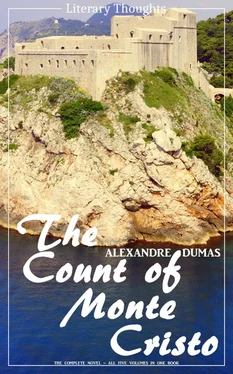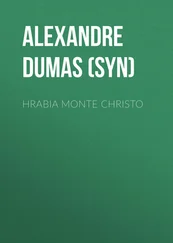"Let us first see," said he, "whether it is possible to remove the traces of my entrance here – our future tranquillity depends upon our jailers being entirely ignorant of it." Advancing to the opening, he stooped and raised the stone easily in spite of its weight; then, fitting it into its place, he said, –
"You removed this stone very carelessly; but I suppose you had no tools to aid you."
"Why," exclaimed Dantes, with astonishment, "do you possess any?"
"I made myself some; and with the exception of a file, I have all that are necessary, – a chisel, pincers, and lever."
"Oh, how I should like to see these products of your industry and patience."
"Well, in the first place, here is my chisel." So saying, he displayed a sharp strong blade, with a handle made of beechwood.
"And with what did you contrive to make that?" inquired Dantes.
"With one of the clamps of my bedstead; and this very tool has sufficed me to hollow out the road by which I came hither, a distance of about fifty feet."
"Fifty feet!" responded Dantes, almost terrified.
"Do not speak so loud, young man – don't speak so loud. It frequently occurs in a state prison like this, that persons are stationed outside the doors of the cells purposely to overhear the conversation of the prisoners."
"But they believe I am shut up alone here."
"That makes no difference."
"And you say that you dug your way a distance of fifty feet to get here?"
"I do; that is about the distance that separates your chamber from mine; only, unfortunately, I did not curve aright; for want of the necessary geometrical instruments to calculate my scale of proportion, instead of taking an ellipsis of forty feet, I made it fifty. I expected, as I told you, to reach the outer wall, pierce through it, and throw myself into the sea; I have, however, kept along the corridor on which your chamber opens, instead of going beneath it. My labor is all in vain, for I find that the corridor looks into a courtyard filled with soldiers."
"That's true," said Dantes; "but the corridor you speak of only bounds one side of my cell; there are three others – do you know anything of their situation?"
"This one is built against the solid rock, and it would take ten experienced miners, duly furnished with the requisite tools, as many years to perforate it. This adjoins the lower part of the governor's apartments, and were we to work our way through, we should only get into some lock-up cellars, where we must necessarily be recaptured. The fourth and last side of your cell faces on – faces on – stop a minute, now where does it face?"
The wall of which he spoke was the one in which was fixed the loophole by which light was admitted to the chamber. This loophole, which gradually diminished in size as it approached the outside, to an opening through which a child could not have passed, was, for better security, furnished with three iron bars, so as to quiet all apprehensions even in the mind of the most suspicious jailer as to the possibility of a prisoner's escape. As the stranger asked the question, he dragged the table beneath the window.
"Climb up," said he to Dantes. The young man obeyed, mounted on the table, and, divining the wishes of his companion, placed his back securely against the wall and held out both hands. The stranger, whom as yet Dantes knew only by the number of his cell, sprang up with an agility by no means to be expected in a person of his years, and, light and steady on his feet as a cat or a lizard, climbed from the table to the outstretched hands of Dantes, and from them to his shoulders; then, bending double, for the ceiling of the dungeon prevented him from holding himself erect, he managed to slip his head between the upper bars of the window, so as to be able to command a perfect view from top to bottom.
An instant afterwards he hastily drew back his head, saying, "I thought so!" and sliding from the shoulders of Dantes as dextrously as he had ascended, he nimbly leaped from the table to the ground.
"What was it that you thought?" asked the young man anxiously, in his turn descending from the table.
The elder prisoner pondered the matter. "Yes," said he at length, "it is so. This side of your chamber looks out upon a kind of open gallery, where patrols are continually passing, and sentries keep watch day and night."
"Are you quite sure of that?"
"Certain. I saw the soldier's shape and the top of his musket; that made me draw in my head so quickly, for I was fearful he might also see me."
"Well?" inquired Dantes.
"You perceive then the utter impossibility of escaping through your dungeon?"
"Then," pursued the young man eagerly –
"Then," answered the elder prisoner, "the will of God be done!" and as the old man slowly pronounced those words, an air of profound resignation spread itself over his careworn countenance. Dantes gazed on the man who could thus philosophically resign hopes so long and ardently nourished with an astonishment mingled with admiration.
"Tell me, I entreat of you, who and what you are?" said he at length; "never have I met with so remarkable a person as yourself."
"Willingly," answered the stranger; "if, indeed, you feel any curiosity respecting one, now, alas, powerless to aid you in any way."
"Say not so; you can console and support me by the strength of your own powerful mind. Pray let me know who you really are?"
The stranger smiled a melancholy smile. "Then listen," said he. "I am the Abbe Faria, and have been imprisoned as you know in this Chateau d'If since the year 1811; previously to which I had been confined for three years in the fortress of Fenestrelle. In the year 1811 I was transferred to Piedmont in France. It was at this period I learned that the destiny which seemed subservient to every wish formed by Napoleon, had bestowed on him a son, named king of Rome even in his cradle. I was very far then from expecting the change you have just informed me of; namely, that four years afterwards, this colossus of power would be overthrown. Then who reigns in France at this moment – Napoleon II.?"
"No, Louis XVIII."
"The brother of Louis XVII.! How inscrutable are the ways of providence – for what great and mysterious purpose has it pleased heaven to abase the man once so elevated, and raise up him who was so abased?"
Dantes' whole attention was riveted on a man who could thus forget his own misfortunes while occupying himself with the destinies of others.
"Yes, yes," continued he, "'Twill be the same as it was in England. After Charles I., Cromwell; after Cromwell, Charles II., and then James II., and then some son-in-law or relation, some Prince of Orange, a stadtholder who becomes a king. Then new concessions to the people, then a constitution, then liberty. Ah, my friend!" said the abbe, turning towards Dantes, and surveying him with the kindling gaze of a prophet, "you are young, you will see all this come to pass."
"Probably, if ever I get out of prison!"
"True," replied Faria, "we are prisoners; but I forget this sometimes, and there are even moments when my mental vision transports me beyond these walls, and I fancy myself at liberty."
"But wherefore are you here?"
"Because in 1807 I dreamed of the very plan Napoleon tried to realize in 1811; because, like Machiavelli, I desired to alter the political face of Italy, and instead of allowing it to be split up into a quantity of petty principalities, each held by some weak or tyrannical ruler, I sought to form one large, compact, and powerful empire; and, lastly, because I fancied I had found my Caesar Borgia in a crowned simpleton, who feigned to enter into my views only to betray me. It was the plan of Alexander VI. and Clement VII., but it will never succeed now, for they attempted it fruitlessly, and Napoleon was unable to complete his work. Italy seems fated to misfortune." And the old man bowed his head.
Читать дальше












